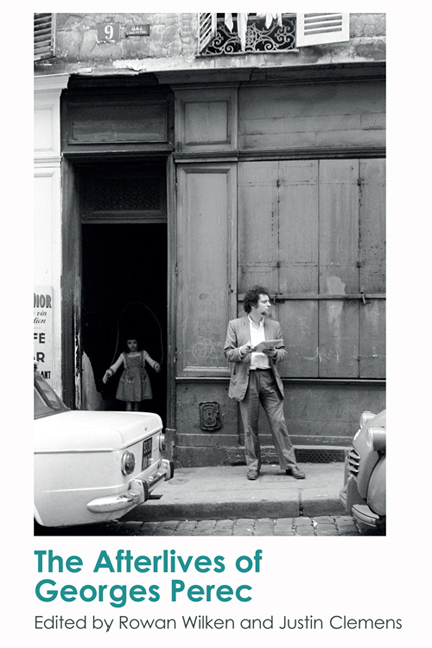Book contents
- Frontmatter
- Contents
- List of Figures
- Acknowledgements
- Notes on Contributors
- 1 Posthumous News: The Afterlives of Georges Perec
- PART I Art of the (Un)realisable
- PART II The Poetics of the Quotidian and Urban Space
- PART III Ludic Intensities and Creative Constraints
- PART IV Productive Problems of Description and Transcription
- Afterword
- 14 The Afterlives of a Writer
- Index
14 - The Afterlives of a Writer
from Afterword
Published online by Cambridge University Press: 07 December 2017
- Frontmatter
- Contents
- List of Figures
- Acknowledgements
- Notes on Contributors
- 1 Posthumous News: The Afterlives of Georges Perec
- PART I Art of the (Un)realisable
- PART II The Poetics of the Quotidian and Urban Space
- PART III Ludic Intensities and Creative Constraints
- PART IV Productive Problems of Description and Transcription
- Afterword
- 14 The Afterlives of a Writer
- Index
Summary
In the writing business, dying is not a good idea. You lose your chance of a Nobel Prize and you have to give up book tours and television chat shows. You aren't writing anything new, so your publisher has less reason to keep your back titles in print. True, you get your name in the papers for a few days when the obituaries come out, but that is usually the end. Most major authors suffer posthumous occlusion for a couple of decades and only some of them re-emerge after a generation-length gap. This cycle has been observed many times in the history of literature. Although it is not amenable to the kind of measurement applied to economic cycles, the ‘generational succession’ of literary eminence in roughly thirty-five-year waves is one well-established way of accounting for how the canon gets shaped.
By this yardstick, Georges Perec should be emerging around now, from a period of relative obscurity, to take his place in the literary pantheon. It is true that he is at last scheduled to appear in the most prestigious ‘complete works’ collection in France, the Bibliotheque de la Pléiade, but the story of his posthumous life is in most other respects quite possibly unique.
When he fell victim to cancer in 1982, Perec was not at the forefront of the literary scene. He had enjoyed two brief moments of prominence – on the publication of Things, which won the Renaudot Prize in 1965, and with Life A User's Manual, which took the Prix Médicis in 1978. However, none of the fifteen other books he published in his lifetime brought him near the limelight. What Little Moped with Chrome-plated Handlebars at the Back of the Yard?, A Man Asleep, La Boutique Obscure and W or The Memory of Childhood were commercial flops and ignored by most critics. Unlike his more visible literary contemporaries, Perec didn't belong to any one publishing house, let alone to the prestigious imprints of Gallimard or Minuit. He wasn't a publisher's editor or a directeur de collection. Unlike Philippe Sollers, he didn't run a literary review, and he didn't judge literary prizes, unlike Alain Robbe-Grillet. He'd been on the television book show Apostrophes only once, where he didn't make much of an impression, and his radio work, which had mostly been done abroad, was almost a secret in France.
- Type
- Chapter
- Information
- The Afterlives of Georges Perec , pp. 245 - 256Publisher: Edinburgh University PressPrint publication year: 2017



